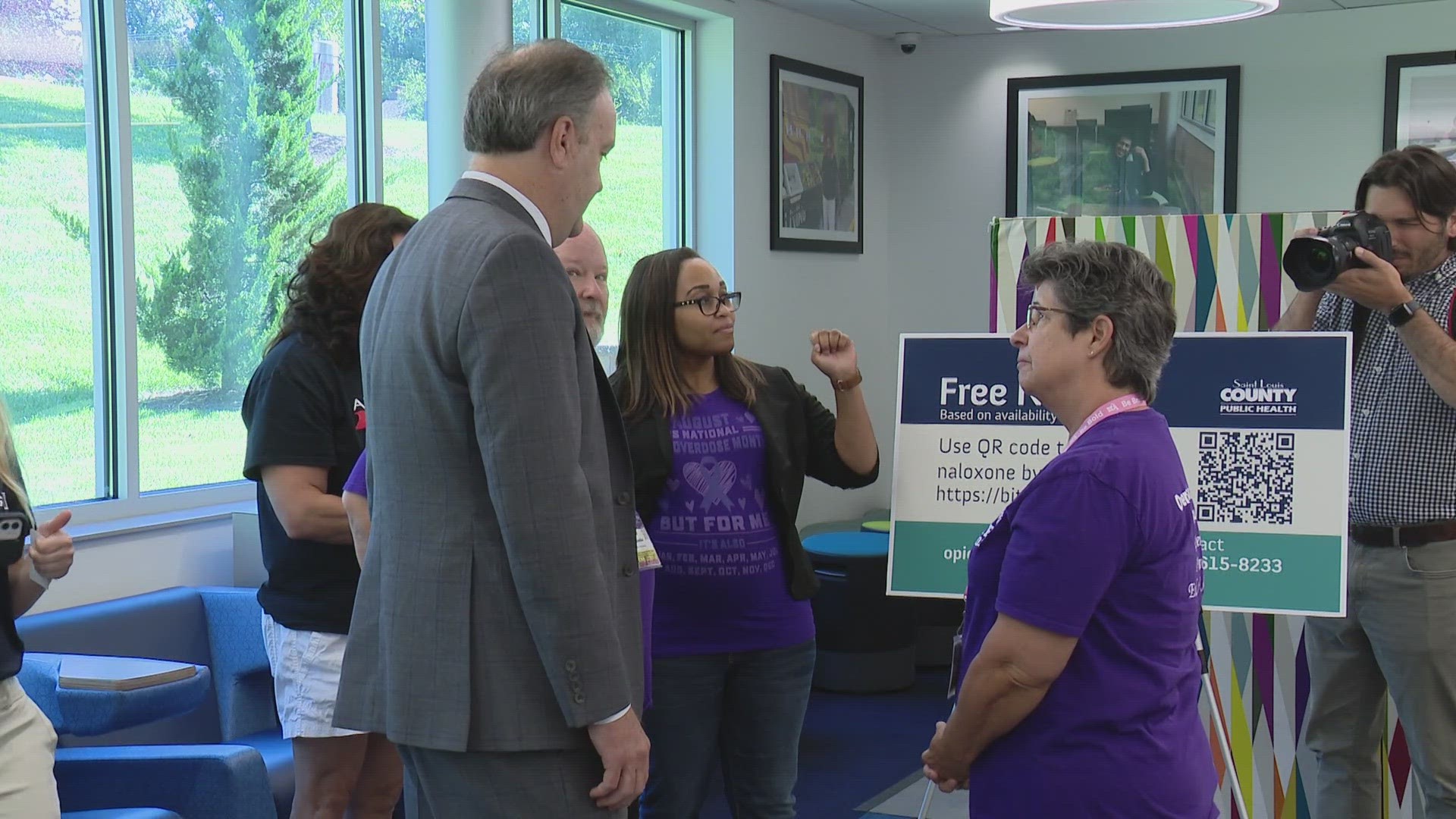ST. LOUIS COUNTY, Mo. — There's a new partnership in St. Louis County to fight the opioid epidemic.
The announcement comes on International Overdose Awareness Day, when we remember the many lives lost from addiction.
This new initiative with St. Louis County Libraries is a huge step in St. Louis County's plan to help address the opioid epidemic.
All 20 library branches will now be a critical resource in breaking the stigma around substance abuse with the hope of saving more lives.
It's something that's preventable, but it continues to take the lives of loved ones daily, according to St. Louis County Executive Dr. Sam Page.
"Last year, 449 people died of an overdose in St. Louis County," he said.
67% of those deaths were opioid-related. According to Page, addiction is killing more than guns.
"To put that into context, more people died of an opioid overdose in the last year than died from homicides in the last two years put together in St. Louis County," he said.
Dr. Kanika Cunningham, St. Louis County Department of Public Health director, said they're hoping to stop that trend, which is why they announced a new partnership with St. Louis County Libraries.
"This is one way for us to expand access to naloxone to our communities, so it's an exciting time for us to continue to build relationships and make sure that individuals don't have to rely on coming into a health care system to receive naloxone, but they can visit a library branch or even come to the health department to receive free naloxone," she said.
The live-saving drug, which instantly reverses an opioid overdose, will now be given out for free at all 20 library branches, according to St. Louis County Library Director Kristen Sorth.
"Libraries are a trusted and safe space. People come to the library for answers and assistance, and our amazing employees are there for the community every single day. Individuals who need a kit can request one with no questions asked," she said.
For many who filled the room Thursday morning, like Erin Johnston, this was personal.
"I have a lot of people that are really close to me that have really struggled with this issue. There are all kinds of things that people begin to use to become dependent on, and it makes their life really difficult," she said.
Johnston is executive director of the nonprofit Addiction is Real. She believes putting tools like Narcan in the hands of the community is huge.
"I think is groundbreaking behavior. We're really saying every single person in this community is important to us," she said.
According to Cunningham, this is just the beginning in the county's substance use action plan.
"Naloxone is one component, but reducing the stigma related to such, but then also feeling comfortable talking about harm reduction principles. We need to rely on all of those different methods and strategies to reduce overdoses.," she said.
Health officials, like Dr. Cunningham, believe all of that combined can help stop this epidemic that continues to plague our community.
"Carry naloxone, get comfortable carrying it and just create that welcoming environment for any and everyone. Loved ones all the way from actively using to those who are in recovery, just create that supportive environment so we can also save lives together," she said.
There are disparities in drug-involved mortality. According to Cunningham, Black men die at a rate 2.5 times higher than the next closest demographic group.
"Black residents of Saint Louis County visited the hospital for non-fatal opioid overdoses 3.4 times higher than white residents. Lastly, over the last five years, Black children less than 15 years old accounted for 74% of the deaths in the youngest age group, so there's much more work for us to do," she said.
According to Page, overdose deaths are down in the county by 11% and health officials believe part of that decrease is because Narcan is more widely available.
"While we're glad to see the decrease in overdose deaths, one year does not make a trend. We must continue to work to break up the stigma around overdose, around substance abuse, and we must do everything we can in our efforts to increase harm reduction," he said.
Narcan is also available for free at all three of St. Louis County's health department clinics.
The health department provides training on how to administer Narcan, recognize an overdose and what to do while you're waiting for help to arrive. The training only takes 45 minutes.

